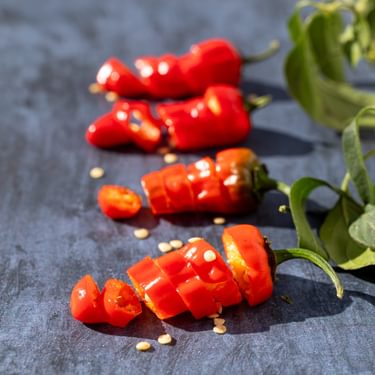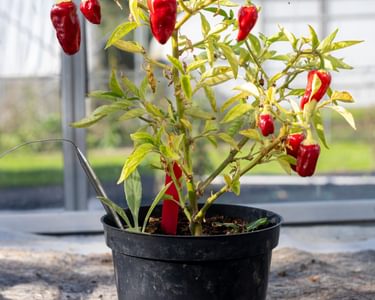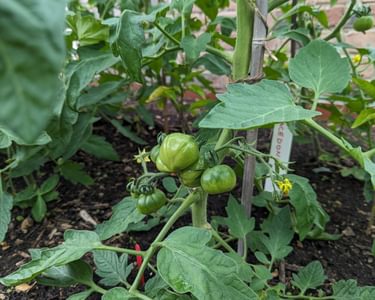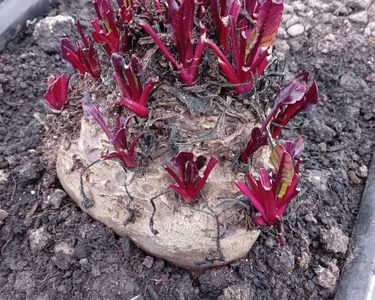
This year's Heritage Seed Library seed trials

The Heritage Seed Library is a living and dynamic collection, and we actively find, assess and conserve rediscovered heritage varieties. Each year we typically reintroduce five to 10 heritage varieties, conducting growing trials and evaluating before adding to the collection, ensuring they're securely conserved for future generations.
Each conserved variety helps to counter the continuing decline in biodiversity. Importantly, open pollinated or naturally regenerated varieties are genetically variable, just like individuals in a population rather than clone copies. This means they have the potential genes to adapt to the growing challenges of the future, such as increased droughts, flooding and extreme temperatures. Getting people growing and enjoying heritage varieties is an important way to reduce genetic erosion and build the resilience that open pollinated varieties offer in back gardens around the country.
This year at Ryton, we are trialling re-discovered heritage varieties to check for health, cross-pollination and description. During the growing season we record the features and performance of each crop, including taking measurements and images to evaluate their progress. These include:

Beetroot
MacGregor's Favourite Beet
A dual purpose 19th century Scottish variety grown for both its tender leaves and for its long roots. We started the growing trial in 2023 to assess first year performance and selected the best examples for overwintering. As a biennial crop in terms of seed production we are now in its second year for cultivation, pollination and seed harvest.
Pepper
Hinkelhatz
Our donor originally obtained these seeds from a gene bank in Alberta, Canada. Translated from Pennsylvanian Dutch as chicken heart, which accurately describes its size and shape. Described by Horticulturist and food historian, William Woys Weaver, in ‘Heirloom Vegetable Gardening’ as among the oldest varieties of hot pepper preserved by the Pennsylvanian Dutch. Reportedly a hot chilli!
Squash
Aubergine Blanche
C. pepo.
Don't be confused by the name! This is a beautiful white squash originates in France, and originally came to us from its donor via the US Seed Savers Exchange 25 years ago. Attempts to grow from orginal seed had failed and we believed we had no further viable seed. However, we have successfully germinated a sample from frozen storage at Warwick University's vegetable gene bank.
Tomato
Double Rich
Indeterminate. Cordon. Developed in 1953 by A Yeager, Head of Horticulture at the University of North Dakota and University of New Hampshire by crossing Lycopersicon peruvianum (wild Peruvian tomato) and 'Michigan State Forcing'. Produces full-flavoured, scarlet fruits 7-8cm in diameter and reportedly contains twice the vitamin C, hence the name. It is also thought to show some resistance to blight.
Updated July 2024: After assessing the fruit shape and flower type we have concluded that, unfortunately, this variety is not Double Rich tomato. While there are two very different descriptions of the same name (one a beefsteak, the other a smooth fruit) the variability observed on these plants suggest it is neither version, and likely to have cross-pollinated.
Green Grape
Although no longer commercially listed in the UK we have grown from a donated seed sample. Believed to have been developed by US company Tater Mater Seeds, it was described at the time as the first and only green cherry tomato. Its distinctive small green yellow fruits and bright green flesh when ripe, resemble large Muscat grapes. Described as delicious and having an unusual sweet spicy flavour.

Once secured in the library, these will be maintained as a living collection, supported by our Seed Guardians, and eventually shared with our members when we have sufficient seed. Each conserved variety helps counter the continuing decline in biodiversity and builds resilience in our food system as an open-pollinated seed.
If you're interested in supporting our trials – join us! Your membership will help support the important conservation work we do. You can also help by making a donation here to assist us with the cover costs of materials such as compost or if you would like to sponsor an entire trial, then please get in touch with our fundraising team via email.
Join Garden Organic!
By becoming a Garden Organic member you can join thousands of people who are already leading the movement for an organic and sustainable future for us all. And get great member benefits!
Join today